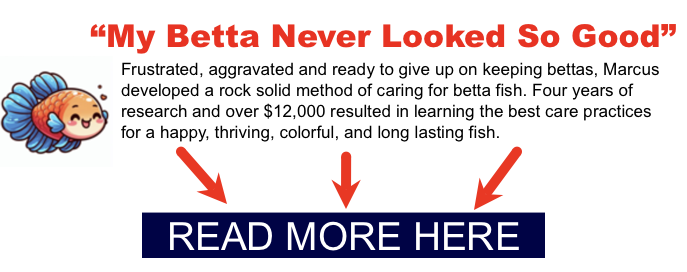Is Your Betta Fish Unhealthy & Dying? Signs of Illness and How to Help
Seeing your beloved betta fish exhibiting signs of ill health and possibly nearing death can be a truly upsetting experience. But don’t despair just yet! Many betta fish illnesses can be successfully treated if caught early enough. This guide will equip you with the knowledge to recognize the signs of an unhealthy betta, understand potential causes of their condition, and take the necessary steps to help your finned friend get back on track.One
One of the best ways to deal with these unknowns is to pickup a copy of this care guide – it literally takes all the pain away from this process.
Recognizing Signs of Illness and a Dying Betta
Click here to learn how to help your betta be happy and healthy again
Your betta fish can’t tell you when they’re not feeling well, but their bodies and behavior will often give you clues:
Visual Red Flags:
- Faded Colors: Vibrant hues turning dull or pale can signal stress or illness.
- Clamped Fins: Fins held close to the body instead of fanned out are often a sign of discomfort.
- Damaged Fins: Torn, frayed, or rotting fins can indicate infection or poor water quality.
- Body Abnormalities: Bloating, lumps, or white spots could be signs of internal issues or parasites.
- Eye Problems: Cloudy, bulging, or protruding eyes often signify infection or injury.
Behavioral Changes to Watch For:
- Lethargy: If your normally active betta is suddenly sluggish, hiding, or struggling to swim, something is wrong.
- Loss of Appetite: Refusing food or spitting it out is a common symptom of many illnesses.
- Labored Breathing: Rapid gill movement or gasping at the surface can indicate trouble breathing.
What’s Making Your Betta Sick?
There are several potential culprits behind your betta’s ailment:
- Water Woes: Poor water quality is a leading cause of betta fish illness. High ammonia, nitrite, or nitrate levels, incorrect temperature, or dirty water can all wreak havoc on their health.
- Nasty Infections: Bacterial, fungal, or parasitic infections like fin rot, ich (white spot disease), and velvet are common in betta fish.
- Stressful Situations: Overcrowding, aggressive tank mates, sudden changes in their environment, or even boredom can stress out your betta and compromise your immune system.
- Physical Injuries: Sharp tank decorations or aggressive fish can cause cuts and abrasions that can become infected.
- Old Age: As betta fish get older, they become more susceptible to illness.
How to Nurse Your Betta Back to Health:
Click here to learn how to improve your betta’s outlook
- Test the Waters: Use a reliable water test kit to check for ammonia, nitrite, nitrate, pH, and temperature. Address any imbalances immediately with partial water changes and adjustments to your filter or heater.
- Quarantine (If Possible): If you have other fish, move your sick betta to a separate, clean tank to prevent the spread of disease.
- Play Detective: Research the symptoms you’ve observed and try to diagnose the problem. Use reputable sources like betta fish forums and care guidesthat specialize in betta fish with expert advice and opinions.
- Treat the Illness: Follow the appropriate treatment protocol once you’ve identified the problem. This may involve medication, specific water changes, adjusting tank conditions, or other remedies.
- Provide TLC: Clean the tank, maintain optimal water temperature, and offer high-quality food to boost your betta’s immune system.
When to Call in the Experts:
- If you’re unsure about the diagnosis.
- If the condition doesn’t improve or worsens with home treatment.
- If your betta appears to be in severe pain or distress.
Prevention is the Best Medicine:
- Regular Tank Maintenance: Keep the water clean with frequent partial water changes and filter cleaning.
- Optimal Diet: Feed your betta a balanced, high-quality diet appropriate for their species.
- Stress-Free Zone: Ensure a peaceful environment with adequate space and no aggressive tankmates.
- Quarantine Newcomers: Always quarantine new fish before introducing them to your main tank to prevent the spread of disease.
Don’t Give Up Hope!
With prompt attention and proper care, many betta fish make full recoveries. Remember, the sooner you identify and address the problem, the better the chances are for your betta to bounce back to their vibrant, healthy self. In addition to online resources, consulting care guides written by experienced betta fish breeders or aquarists is a smart way to troubleshoot common problems and find effective treatment solutions. These guides often contain detailed information on specific diseases, step-by-step treatment plans, and helpful diagrams or illustrations to aid in diagnosis.
